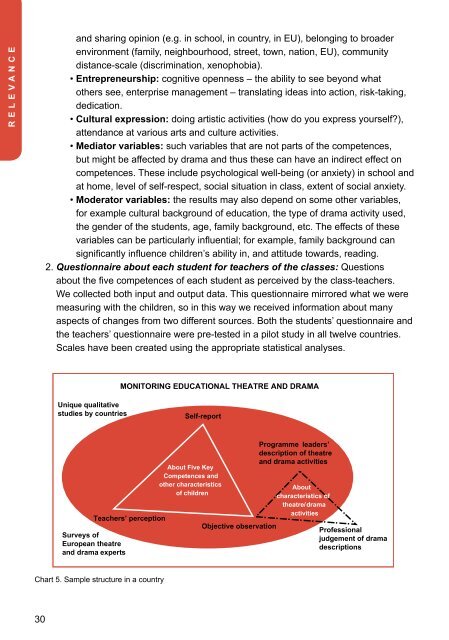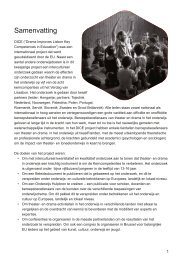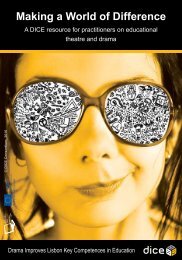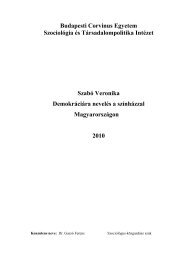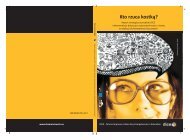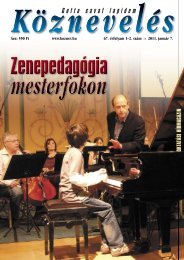Policy Paper - Drama Improves Lisbon Key Competences in Education
Policy Paper - Drama Improves Lisbon Key Competences in Education
Policy Paper - Drama Improves Lisbon Key Competences in Education
You also want an ePaper? Increase the reach of your titles
YUMPU automatically turns print PDFs into web optimized ePapers that Google loves.
Relevance<br />
and shar<strong>in</strong>g op<strong>in</strong>ion (e.g. <strong>in</strong> school, <strong>in</strong> country, <strong>in</strong> EU), belong<strong>in</strong>g to broader<br />
environment (family, neighbourhood, street, town, nation, EU), community<br />
distance-scale (discrim<strong>in</strong>ation, xenophobia).<br />
• Entrepreneurship: cognitive openness – the ability to see beyond what<br />
others see, enterprise management – translat<strong>in</strong>g ideas <strong>in</strong>to action, risk-tak<strong>in</strong>g,<br />
dedication.<br />
• Cultural expression: do<strong>in</strong>g artistic activities (how do you express yourself?),<br />
attendance at various arts and culture activities.<br />
• Mediator variables: such variables that are not parts of the competences,<br />
but might be affected by drama and thus these can have an <strong>in</strong>direct effect on<br />
competences. These <strong>in</strong>clude psychological well-be<strong>in</strong>g (or anxiety) <strong>in</strong> school and<br />
at home, level of self-respect, social situation <strong>in</strong> class, extent of social anxiety.<br />
• Moderator variables: the results may also depend on some other variables,<br />
for example cultural background of education, the type of drama activity used,<br />
the gender of the students, age, family background, etc. The effects of these<br />
variables can be particularly <strong>in</strong>fluential; for example, family background can<br />
significantly <strong>in</strong>fluence children’s ability <strong>in</strong>, and attitude towards, read<strong>in</strong>g.<br />
2. Questionnaire about each student for teachers of the classes: Questions<br />
about the five competences of each student as perceived by the class-teachers.<br />
We collected both <strong>in</strong>put and output data. This questionnaire mirrored what we were<br />
measur<strong>in</strong>g with the children, so <strong>in</strong> this way we received <strong>in</strong>formation about many<br />
aspects of changes from two different sources. Both the students’ questionnaire and<br />
the teachers’ questionnaire were pre-tested <strong>in</strong> a pilot study <strong>in</strong> all twelve countries.<br />
Scales have been created us<strong>in</strong>g the appropriate statistical analyses.<br />
Unique qualitative<br />
studies by countries<br />
Teachers’ perception<br />
Surveys of<br />
European theatre<br />
and drama experts<br />
MONITORING EDUCATIONAL THEATRE AND DRAMA<br />
Self-report<br />
About Five <strong>Key</strong><br />
<strong>Competences</strong> and<br />
other characteristics<br />
of children<br />
Objective observation<br />
Programme leaders’<br />
description of theatre<br />
and drama activities<br />
About<br />
characteristics of<br />
theatre/drama<br />
activities<br />
Professional<br />
judgement of drama<br />
descriptions<br />
3. Structured observation of educational theatre and<br />
drama activity: The one-occasion activities, and<br />
one lesson from each exam<strong>in</strong>ed “cont<strong>in</strong>uous<br />
activity” group (at around the two-thirds<br />
po<strong>in</strong>t of the measured process), were<br />
observed by two <strong>in</strong>dependent observers per<br />
occasion, who had been tra<strong>in</strong>ed <strong>in</strong> the use<br />
of a simple cod<strong>in</strong>g-system. The observation<br />
grid developed for the project focused on<br />
the sequence of special work forms of<br />
activities and on the occurrence of various<br />
<strong>in</strong>teractions dur<strong>in</strong>g them. By monitor<strong>in</strong>g these<br />
activities, not only the ma<strong>in</strong> <strong>in</strong>itiators of <strong>in</strong>teractions<br />
but also the quality and direction of <strong>in</strong>teractions could be<br />
def<strong>in</strong>ed. Important activities or events that <strong>in</strong>dicate the presence of one of the five<br />
competences (e.g. express<strong>in</strong>g an idea, co-operation among children, etc.) were<br />
<strong>in</strong>cluded <strong>in</strong> the cod<strong>in</strong>g-system. Every relevant event or activity had to be noted by<br />
the observers.<br />
4. Structured description by each programme leader about their educational<br />
theatre and drama activities (this <strong>in</strong>cluded some multiple choice and some<br />
open questions): To specify the follow<strong>in</strong>g: group size, methods used, forms of<br />
evaluation, professional background of the programme leader, etc.<br />
5. Independent (“bl<strong>in</strong>d”) professional pre-classification of the programmes:<br />
Accord<strong>in</strong>g to these descriptions two <strong>in</strong>dependent professionals “bl<strong>in</strong>dly” preclassified<br />
the programmes accord<strong>in</strong>g to their estimated efficacy.<br />
6. Structured survey from the project leaders and other European theatre and<br />
drama leaders about the situation of educational theatre and drama <strong>in</strong> their<br />
countries: Topics <strong>in</strong>cluded: tra<strong>in</strong><strong>in</strong>g for theatre and drama <strong>in</strong> education, schools<br />
(effects on learn<strong>in</strong>g and personal life), education policy (aims and op<strong>in</strong>ions).<br />
7. Different qualitative research studies conducted <strong>in</strong>dependently by the country<br />
partners: partners <strong>in</strong> the United K<strong>in</strong>gdom conducted a piece of qualitative research<br />
on young people’s views of a Theatre In <strong>Education</strong> programme, and <strong>in</strong> Poland on<br />
entrepreneurship.<br />
8. Secondary research: previous research studies <strong>in</strong> the field of educational theatre<br />
and drama have been widely reviewed by a group of <strong>in</strong>ternational academics.<br />
Relevance<br />
Chart 5. Sample structure <strong>in</strong> a country<br />
30<br />
31


